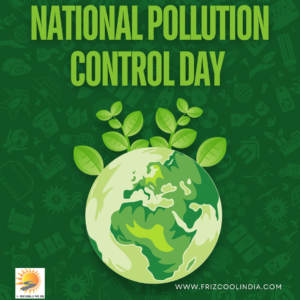National Pollution Control Day: A Call for Environmental Responsibility
National Pollution Control Day, observed annually on December 2, serves as a critical reminder of the need to protect our environment from the harmful effects of pollution. This day commemorates the lives lost in the Bhopal Gas Tragedy of 1984, one of the world’s worst industrial disasters, and emphasizes the importance of pollution control measures to prevent such incidents in the future.
Significance of National Pollution Control Day
The primary objective of National Pollution Control Day is to raise awareness about the dangers of environmental pollution and the need for effective pollution control strategies. It aims to:
- Honor the Victims: Remember those who lost their lives or were affected by the Bhopal Gas Tragedy.
- Raise Awareness: Educate individuals, industries, and governments about the impact of pollution on human health and the environment.
- Promote Sustainable Practices: Encourage the adoption of eco-friendly and sustainable practices to reduce pollution.

Types of Pollution
Pollution affects every aspect of our lives, and it comes in various forms:
- Air Pollution: Emissions from industries, vehicles, and deforestation contribute to poor air quality, leading to respiratory diseases and global warming.
- Water Pollution: Industrial waste, agricultural runoff, and plastic pollution contaminate water bodies, affecting marine life and human health.
- Soil Pollution: Excessive use of pesticides, chemicals, and industrial waste degrades soil quality, impacting agriculture and food security.
- Noise Pollution: Urbanization, traffic, and industrial activities contribute to noise pollution, leading to stress and hearing-related issues.
The Impact of Pollution
Pollution has far-reaching consequences for both the environment and human health:
- Health Hazards: Respiratory diseases, cardiovascular problems, and cancer are directly linked to air and water pollution.
- Climate Change: Greenhouse gas emissions contribute to global warming, leading to extreme weather events, rising sea levels, and biodiversity loss.
- Loss of Biodiversity: Pollution disrupts ecosystems, leading to the extinction of plant and animal species.
Pollution Control Measures
Addressing pollution requires a collective effort from individuals, industries, and governments. Here are some effective pollution control measures:
- Reduce, Reuse, Recycle: Minimize waste generation and promote recycling to reduce the burden on landfills and the environment.
- Adopt Clean Energy: Transition to renewable energy sources like solar, wind, and hydroelectric power to reduce dependence on fossil fuels.
- Enforce Regulations: Governments must implement and enforce strict pollution control regulations for industries and vehicles.
- Promote Afforestation: Planting trees helps absorb carbon dioxide, improve air quality, and maintain ecological balance.
- Raise Awareness: Educate the public about the importance of reducing pollution and adopting sustainable practices.
The Role of Industries
Industries play a significant role in pollution control. They must adopt environmentally friendly practices such as:
- Installing Pollution Control Equipment: Use of scrubbers, filters, and other equipment to minimize emissions.
- Waste Management: Proper disposal and treatment of industrial waste to prevent contamination of water and soil.
- Energy Efficiency: Implementing energy-efficient technologies to reduce carbon emissions and conserve resources.
Conclusion
National Pollution Control Day is a reminder of our collective responsibility to protect the environment. By adopting sustainable practices, raising awareness, and enforcing regulations, we can reduce pollution and create a healthier, greener future for generations to come. Each small step towards reducing pollution can lead to a significant impact on the environment and human well-being. Let us all pledge to work together for a cleaner and healthier planet.
